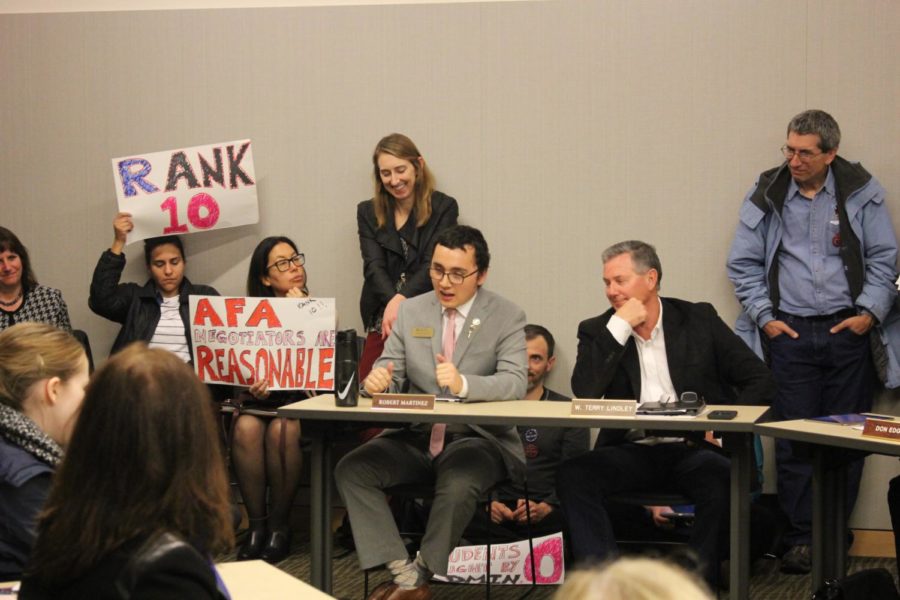A controversial statewide initiative that aims to restructure the California community college system received a unanimous vote in favor by the Board of Trustees and spurred debate among faculty members in the Academic Senate during the organizations’ special sessions on Wednesday.
California Assembly Bill 19 (AB19) requires California community colleges to adopt the “Guided Pathways” program along with four other requirements to receive aid in the form of grants and the Board of Governors (BOG) fee waiver.
The Chancellor’s Office introduced the program last spring in a document titled, “Vision for Success,” which cites low graduation and transfer rates, length of enrollment, lack of services to older and working students, expense to students and taxpayers and achievement gaps in different student demographics as problems it aims to solve.
“The governor, the state legislature and the chancellor are making some radical changes to our funding model,” SRJC President Frank Chong said at the board meeting. “I think it’s important as these changes come down the pipe that we understand what they mean. I’m asking the board to listen to the concerns of the faculty, students and administrators to ask questions and make an informed decision about Guided Pathways.”
He expressed reservations about being coerced with grant money the college won’t receive if it opts out, but believes SRJC should enact the program. “To some degree, we are somewhat held hostage,” Chong said. “I would make a pledge to the faculty that we would work with you to make it work for the JC.”
Dr. Chong is one of five signatories required to enact the program; Board President Maggie Fishman, Vice President Mary Kay Rudolph, Vice President Pedro Avila and Academic Senate President Eric Thompson all must also vote in favor of Guided Pathways for Santa Rosa Junior College to adopt it.
“Vision for Success,” proposes a system that encourages speedy graduation and transfer rates and focuses on job placement as the ultimate end of education. Critics of the proposal say the document fails to clearly show how curriculums will change and if student and faculty choices will be respected.
Proponents said the proposal should be adopted to help students navigate the higher education system, reduce accidental enrollment in unnecessary courses, provide a system to aid struggling students and so SRJC receives adequate funding.
Faculty members such as Nicole Slovak and Debbie Elders criticized Guided Pathways and the shortage of time the community has had to review it. Members such as Janet Cox and Dr. Robert Holcomb said the program must be adopted to ensure the proper allocation of funding.
English instructor Julie Thompson criticized what she said were the board’s deceitful methods to undermine the faculty by scheduling the meeting at a time when many faculty members would be unable to attend and providing biased literature with the meeting’s agenda.
Thompson received applause following remarks about the state’s interference with the faculty.
“I want for us to define what we think is excellence for our students and how we can best get them through to completion,” Thompson said. “I don’t want to be told by the state how to do it.”
Student Trustee Robert Martinez and Student Government Assembly (SGA) President Evelyn Navarro spoke in favor of Guided Pathways.
“It’s just a way for us to get students into the classes they need, without having to take a ton of extra classes,” Martinez said. “Our average is 6.7 years per student.”
Navarro cited lack of guidance as a reason she performed poorly in academics her first years at the college, delaying her graduation.
She said Guided Pathways will help to address achievement gaps and lack of access for disenfranchised or marginalized students.
Faculty members at the Academic Senate, presided over by Eric Thompson, voiced differing opinions on the proposal, and moved to vote on the proposal next week at their regularly scheduled meeting.
Thompson, who does not have a vote, said he would prefer to delay adoption of the proposal until faculty, administrators and students have had more time to review and understand what adoption means.
“What the document actually has us say is that all interested parties in the institution—which includes students, administrators, faculty and classified staff—have been included in the conversation,” Thompson said.
“The students do not feel like they’ve been included in the conversation and we have to be really careful about misrepresenting ourselves.”
Thompson also criticized the coercive nature of the program.
“In a sense, AB19 and the connection to the threat of money—giving money to students or taking it away based on whether or not we do Guided Pathways—is holding a gun to somebody’s head to get them to sign,” Thompson said. “I think a lot of faculty feel like we’re being coerced to sign because none of us wants to harm students, especially financially.”
Vice President Rudolph said initial adoption of the policy allows institutions to withdraw easily, but declining to adopt has long-term consequences.
“My fear is if we pass now, then we pass for the next five years,” Rudolph said. “The bigger picture is we fought so hard to have choice here and if we choose not to be involved then what if five years from now something is adopted at the state level and we won’t have been in the conversation.”
The question of adopting the Guided Pathways program comes at a time when tensions between faculty and the administration are building amid strained contract negotiations.
Throughout the board meeting, individuals representing the All Faculty Association held placards protesting the administration’s stance in the negotiations.
The deadline to sign the initial self-assessment document was extended from December to Feb. 1 following the fires.




